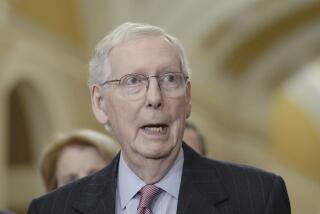Nemesis May Derail Campaign Reform
WASHINGTON — The leading Senate opponent of the campaign finance legislation that cleared the House last week suggested Sunday that he may filibuster the bill in a last-ditch effort to force changes that could derail the reform effort.
Sen. Mitch McConnell (R-Ky.), who has long led an effort to block new limits on political spending, said he was “pretty confident” he had the 41 votes he needs to uphold a potential filibuster--the last congressional obstacle to the most sweeping rewrite of the campaign finance laws in a quarter-century.
“Unless at some point 60 senators decide to let it pass, it will not pass,” McConnell said on “Fox News Sunday.”
But Sen. John McCain (R-Ariz.), the legislation’s leading Senate supporter, expressed confidence that the measure--which has been debated in one form or another since the late 1980s--will finally reach the president’s desk this year. “I am confident that, over time, we will prevail,” McCain said Sunday on NBC’s “Meet the Press.”
The campaign reform legislation would prohibit national political parties from raising and spending the unlimited, virtually unregulated “soft money” contributions that have become the fastest-growing source of money in politics. In the 2000 election, the two parties combined to raise nearly $500 million in soft money. The legislation would also bar independent groups, such as the Sierra Club or the National Rifle Assn., from using soft money to buy campaign ads in the last 60 days before an election.
The Senate approved its version of the legislation in April; the House cleared the bill in a dramatic vote last week. But because the House made small changes in the legislation, the Senate must vote again to accept the House version--or else take their differences to a conference committee, which supporters fear would become the bill’s graveyard.
“If it is sent to conference, it’s dead,” Rep. Christopher Shays (R-Conn.), the co-sponsor of the legislation in the House, said on CBS’ “Face the Nation.”
The supporters’ position in the Senate remains precarious because it takes 60 votes to break a filibuster, if McConnell or other opponents launch one. When it passed the Senate last year, the bill attracted 59 votes.
On Sunday, both McConnell and McCain insisted that they had enough support to prevail. McConnell noted that Sen. Ted Stevens (R-Alaska), who had voted for the bill, now says he will support a filibuster. “I think I will have 41 at the very least . . . to allow us to make changes that may be necessary,” McConnell said.
But McCain said Sen. Ernest F. Hollings (D-S.C.), who initially opposed the bill, has indicated that he would vote to break a filibuster. “I believe there are other senators who will do so also, even if they oppose the legislation,” McCain added.
McConnell predicted that even if the legislation becomes law, reform advocates may well be disappointed by its effect. He argued that the courts are likely to strike down the provisions limiting the election activities of independent groups. That, he said, would simply redirect the soft money now flowing into the parties toward special-interest groups, amplifying their power at the expense of the official Democratic and Republican organizations.
“This isn’t going to take any money out of politics,” McConnell said. “It’s just going to . . . shift it to outside groups.”
President Bush has not signaled his intentions on the bill. But he has never threatened to veto it, and most analysts believe that he would sign it if it reaches his desk. “There were mixed signals sent from the White House during the House debate,” said McCain, Bush’s principal rival for the 2000 Republican nomination, “but I hope he will sign it.”
More to Read
Get the L.A. Times Politics newsletter
Deeply reported insights into legislation, politics and policy from Sacramento, Washington and beyond. In your inbox three times per week.
You may occasionally receive promotional content from the Los Angeles Times.










